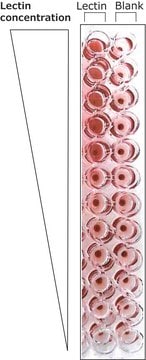MABF735
Anti-KLRG1 Antibody (mouse), FITC, clone 2F1
clone 2F1, 0.5 mg/mL, from hamster(Syrian)
Sinonimo/i:
Killer cell lectin-like receptor subfamily G member 1, Mast cell function-associated antigen 2F1
About This Item
Prodotti consigliati
Origine biologica
hamster (Syrian)
Livello qualitativo
Coniugato
FITC conjugate
Forma dell’anticorpo
purified antibody
Tipo di anticorpo
primary antibodies
Clone
2F1, monoclonal
Reattività contro le specie
mouse
Confezionamento
antibody small pack of 25 μg
Concentrazione
0.5 mg/mL
tecniche
flow cytometry: suitable
immunoprecipitation (IP): suitable
Isotipo
IgG
N° accesso UniProt
Condizioni di spedizione
wet ice
modifica post-traduzionali bersaglio
unmodified
Informazioni sul gene
mouse ... Klrg1(50928)
Categorie correlate
Descrizione generale
Immunogeno
Applicazioni
Inflammation & Immunology
Qualità
Flow Cytometry Analysis: 0.5 µg of this antibody detected KLRG1 in one million C57Bl/6 splenocytes.
Stato fisico
Stoccaggio e stabilità
Esclusione di responsabilità
Non trovi il prodotto giusto?
Prova il nostro Motore di ricerca dei prodotti.
Codice della classe di stoccaggio
12 - Non Combustible Liquids
Classe di pericolosità dell'acqua (WGK)
nwg
Certificati d'analisi (COA)
Cerca il Certificati d'analisi (COA) digitando il numero di lotto/batch corrispondente. I numeri di lotto o di batch sono stampati sull'etichetta dei prodotti dopo la parola ‘Lotto’ o ‘Batch’.
Possiedi già questo prodotto?
I documenti relativi ai prodotti acquistati recentemente sono disponibili nell’Archivio dei documenti.
Il team dei nostri ricercatori vanta grande esperienza in tutte le aree della ricerca quali Life Science, scienza dei materiali, sintesi chimica, cromatografia, discipline analitiche, ecc..
Contatta l'Assistenza Tecnica.







